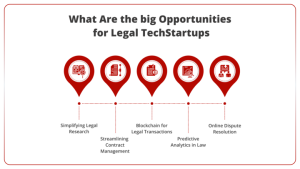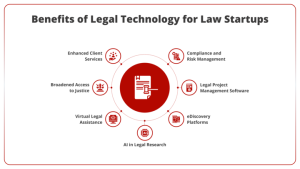Legal technology, or “legal tech,” uses software and technology to streamline legal services. It combines IT and legal expertise to enhance document management, research, case management, and compliance.
Today, legal tech startups have transformed the law practice, equipping you with AI-driven tools and cloud-based solutions that streamline case management and document review. These innovations save time and enhance accuracy, allowing you to focus on serving your clients effectively.
According to Gartner, this momentum isn’t slowing down, with the legal technology market projected to reach $50 billion by 2027. It’s more important than ever to stay informed and engaged with the latest industry trends and technologies.
Attending Destination CLEs conferences gives insight into emerging legal tech and connects you with key industry figures. This is crucial for keeping your practice up-to-date in a rapidly evolving field.
How Is Technology Reshaping the Legal Industry?
Legal tech impacts legal practices by automating manual tasks, reducing costs, increasing accuracy, and improving access to legal services for individuals and organizations.
Current Trends in Law Firm Software
AI Integration: Software now often includes AI to help predict case outcomes or handle routine jobs like writing legal documents.
Client Portals: Many clients prefer law firms that provide online portals for sharing documents and communication. Software adding these features is becoming more common.
Mobile Access: With many lawyers working on the go, software that works well on mobile phones is essential. More providers are creating mobile apps or ensuring their platforms work on mobile devices.
Current Growth of the Legal Tech Industry
- The law practice management software market is growing fast. It’s expected to increase by $1.2 billion from 2020 to 2024. This shows how much law firms rely on specialized software to help manage their work.
- Leading companies like Clio and MyCase are major players. They offer tools that manage cases, handle billing, keep track of clients, schedule events, and store documents. Their software is designed to smoothly integrate with law firms’ daily work.
- Companies like LexisNexis, Relativity, and many other startups are at the forefront of developing various tools, from document automation to eDiscovery and beyond.
- AI in legal tech could generate around $37.9 billion by 2026. It’s changing how legal professionals conduct research, analyze contracts, and predict legal outcomes.
The Challenges Faced by Emerging Legal Tech Startups
While legal tech startups are transforming the legal industry by introducing innovative solutions, they face significant challenges that can impact their growth and adoption.
Regulatory Compliance
Legal tech must comply with stringent regulations concerning data privacy and the management of electronic records. Failure to adhere to these regulations can result in hefty fines and loss of trust among users. Over 60% of legal tech companies cite compliance with global data protection regulations as a major operational hurdle.
Integration with Existing Systems
New technologies must integrate seamlessly with law firms’ older, established systems. Poor integration can lead to disrupted workflows, which may deter law firms from adopting new technologies. Approximately 50% of law firms report difficulties integrating new tech solutions with their IT infrastructure.
Adoption Resistance
There’s often some hesitation within the legal profession, especially among those who are used to old methods. This doubt from important decision-makers can slow the adoption of new technologies, limiting the growth of innovation in this field. About 30% of legal professionals are cautious about using new technologies because they worry it might affect the quality of their services.
These challenges highlight the need for legal tech startups to focus on developing innovative solutions and ensuring they address these critical barriers to successful implementation and adoption.
What Are the Big Opportunities for Legal Tech Startups?
Legal tech startups are tapping into specific niches to address unique challenges within the legal industry. These include:
Simplifying Legal Research
Legal research is essential but time-consuming. Today, startups are using AI to speed up this process, allowing legal professionals to find necessary information quickly. These tools not only save time but are also becoming smarter, providing more precise answers and analyses.
Streamlining Contract Management
Digital tools transform contract management, speed up the process, and reduce mistakes. Startups are creating software that handles everything from creating a contract to ensuring it complies with laws. There’s a lot of room for new businesses to create specialized tools for different industries or to add new features, like using AI to spot potential problems in contracts before they happen.
Blockchain for Legal Transactions
Blockchain technology offers new ways to handle legal transactions with enhanced security and transparency. Startups can use this technology to create secure ways to store documents or to manage contracts that automatically update and execute themselves.
Predictive Analytics in Law
Startups leverage data analytics to predict legal outcomes, providing lawyers with powerful tools for strategy planning based on historical data.
Online Dispute Resolution
Tech platforms are simplifying dispute resolution, making it faster and cheaper, and tailored to specific industries.
Benefits of Legal Technology for Law Startups
Legal technology is reshaping modern law practices by enhancing client services, increasing access to justice, and streamlining internal operations.
Enhanced Client Services
Case Management Portals: Technology improves client-lawyer interactions, allowing clients to view documents, communicate, and track case progress online. This leads to transparent and efficient experiences.
Broadened Access to Justice
Technology helps reduce costs by automating tasks like document production and legal research, enabling firms to offer services at more affordable rates. Technologies such as online dispute resolution and automated legal guidance expand access to legal help, benefiting those who previously could not afford it.
Virtual Legal Assistance
Virtual platforms facilitate legal consultations and advice remotely, eliminating the need for in-person visits and extending services to remote areas.
AI in Legal Research
AI-powered legal advice tools offer quick, reliable answers to legal inquiries and assist with document preparation, streamlining legal processes. These tools feature advanced capabilities such as predictive search, citation analysis, and relevancy ranking. They help legal professionals obtain precise and thorough research results quickly, greatly enhancing their productivity and quality.
eDiscovery Platforms
eDiscovery platforms are essential in managing electronically stored information (ESI) for various legal processes, including litigation and investigations. These platforms facilitate quick searching, sorting, and analyzing large data sets, which is far more efficient than manual methods.
Legal Project Management Software
This software aids in organizing matter management, tracking time, and handling billing efficiently. Additionally, these tools offer analytics and reporting features that help legal teams track case progress and manage budgets effectively. Using such software significantly boosts the management of complex legal projects and enhances team productivity.
Compliance and Risk Management
Advanced software helps firms comply with changing regulations and predict potential legal risks, allowing for proactive management of possible issues.
Effective Sales and Marketing Strategies for Legal Tech Startups
Here are strategies to help these legal tech startupss stand out, connect with clients, and grow.
Industry Events and Conferences
Over 68% of law firms value industry-specific events for exploring new technologies and networking. Destination CLEs conferences offer a unique opportunity to showcase your innovations and engage with decision-makers, blending professional development with cultural experiences to enhance your startup’s visibility and connections.
Referral Programs
With 84% of B2B decision-makers beginning their buying process with a referral, building strong client relationships cannot be overstated. Conferences, such as those organized by Destination CLE, help you connect with peers from the legal industry. Establishing good connections at such events can often lead to multiple referrals, significantly enhancing your business prospects.
Content Marketing
Publishing insightful articles and whitepapers establishes your brand as a thought leader and is crucial for attracting tech-savvy legal professionals.
Webinars and Workshops
These platforms are ideal for explaining complex legal tech solutions through detailed demonstrations and interactive Q&A sessions, enhancing client understanding and engagement.
Search Optimization
Being visible online is essential, as most initial research is done via search engines. Optimizing your web content for search engines can increase your visibility and attract more traffic.
Email Marketing
Email is still a powerful, direct, targeted communication tool. Regular updates, newsletters, and personalized follow-ups can keep your startup top of mind among potential clients.
Engage in Dynamic Learning and Networking with Destination CLEs
Destination CLEs redefine the way legal professionals meet their continuing education requirements. Our conferences blend educational opportunities with cultural immersion in some of the world’s most captivating cities.
Why Choose Destination CLEs?
- Meet CLE Requirements: Fulfill your mandatory CLE credits through engaging, high-quality seminars in stunning global locations.
- Transformative Learning: Turn the usual lecture-based learning on its head by engaging in sessions as dynamic as the destinations.
- Networking Opportunities: Connect with peers worldwide, expanding your professional network in settings that encourage collaboration and growth.
- All-Inclusive Experience: Enjoy comprehensive packages that cover educational sessions, accommodations, and unique cultural experiences, making your learning adventure seamless and memorable.
- Efficient Credit Earning: Earn required CLE credits efficiently, with schedules that balance professional development and exploration.
Plan your next educational journey with Destination CLEs and ensure extraordinary professional development. Our 2024-2025 lineup includes diverse locales such as Lisbon, Puerto Vallarta, Dubai, Havana, and an Alaska Cruise—each offering a distinct blend of legal education and local culture.
Secure your spot today and become part of a community dedicated to professional growth and networking.
YETI Rambler Tumbler with Handle and Straw Lid, Vacuum Insulated Travel Mug, Stainless Steel
DestinationCLEs.com is a participant in the Amazon Services LLC Associates Program, an affiliate advertising program designed to provide a means for sites to earn advertising fees by advertising and linking to Amazon dot com.












